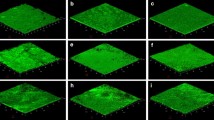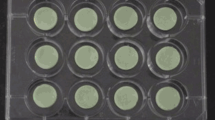Abstract
Polymethylmethacrylate (PMMA) bone cement mixed with antibiotics is used in orthopedic surgery to cope with implant-related infections which are typically associated with the formation of bacterial biofilms. Taking into account the growing bacterial resistance to current antibiotics, we examined here the efficacy of a selected antimicrobial peptide (AMP) mixed into the bone cement to inhibit bacterial adhesion and the consequent biofilm formation on its surface. In particular, we followed the formation of bacterial biofilms of methicillin-resistant Staphylococcus aureus (MRSA) on implants made from PMMA bone cement loaded with AMP composed of 12 amino acid residues. This was evaluated by CFU counting of bacteria released by sonication from the biofilms formed on their surfaces after these implants were retrieved from the infected murine femoral canals. The AMP loaded in these model implants prevented adhesion of MRSA and the subsequent formation of MRSA biofilm on the surfaces of more than 80% of these implants, whereas biofilms did form on control implants made from the plain cement. The results of our experiments performed in the murine femoral canal indicate the potential for this murine osteomyelitis model to mimic actual operations in orthopedics.


Similar content being viewed by others
References
Anagnostakos K, Hitzler P, Pape D, Kohn D, Kelm J (2008) Persistence of bacterial growth on antibiotic-loaded beads: is it actually a problem? Acta Orthop 79:302–307. https://doi.org/10.1080/17453670710015120
Arciola CR, Campoccia D, Ehrlich GD, Montanaro L (2015) Biofilm-based implant infections in orthopaedics. Adv Exp Med Biol 830:29–46. https://doi.org/10.1007/978-3-319-11038-7-2
Baltzer SA, Brown MH (2011) Antimicrobial peptides–promising alternatives to conventional antibiotics. J Mol Microbiol Biotechnol 20:228–235. https://doi.org/10.1159/000331009
Birt MC, Anderson DW, Toby EB, Wang J (2016) Osteomyelitis: recent advances in pathophysiology and therapeutic strategies. J Orthop 14:45–52. https://doi.org/10.1016/j.jor.2016.10.004
Bistolfi A, Massazza G, Verné E, Maseé A, Deledda D, Ferraris S, Miola M, Galetto F, Crova M (2011) Antibiotic-loaded cement in orthopedic surgery: a review. ISRN Orthop. https://doi.org/10.5402/2011/290851
Brogden NK, Brogden KA (2011) Will new generations of modified antimicrobial peptides improve their potential as pharmaceuticals? Int J Antimicrob Agents 38:217–225. https://doi.org/10.1016/j.ijantimicag.2011.05.004
Campoccia D, Montanaro L, Speziale P, Arciola CR (2010) Antibiotic-loaded biomaterials and the risks for the spread of antibiotic resistance following their prophylactic and therapeutic clinical use. Biomaterials 31:6363–6377. https://doi.org/10.1016/j.biomaterials.2010.05.005
Carli AV, Bhimani S, Yang X, de Mesy Bentley KL, Ross FP, Bostrom MPG (2018) Vancomycin loaded polymethylmethacrylate spacers fail to eradicate periprosthetic joint infection in a clinically representative mouse model. J Bone Joint Surg Am 100:e76. https://doi.org/10.2106/JBJS.17.01100
Costa B, Martínez-de-Tejada G, Gomes PAC, Martins MC, Costa F (2021) Antimicrobial peptides in the battle against orthopedic implant-related infections: a review. Pharmaceuticals 13:1918. https://doi.org/10.3390/pharmaceutics13111918
Faber C, Hoogendoorn RJW, Stallmann HP, Lyaruu DM, van Nieuw AA, Wuisman PIJM (2004) In vivo comparison of Dhvar-5 and gentamicin in MRSA osteomyelitis prevention model. J Antimicrob Chemother 54:1078–1084. https://doi.org/10.1093/jac/dkh441
Faber C, Stallmann HP, Lyaruu DM, de Blieck JMA, Bervoets ThJM, van Nieuw AA, Wuisman PIJM (2003) Release of antimicrobial peptide Dhvar-5 from polymethylmethacrylate beads. J Antimicrob Chemother 51:1359–1364. https://doi.org/10.1093/jac/dkg258
Faber C, Stallmann HP, Lyaruu DM, Joosten U, von Eiff C, van Nieuw AA, Wuisman PIJM (2005) Comparable efficacies of the antimicrobial peptide human lactoferrin 1–11 and gentamicin in a chronic methicillin-resistant Staphylococcus aureus osteomyelitis model. Antimicrob Agents Chemother 49:2438–2444. https://doi.org/10.1128/AAC.49.6.2438-2444.2005
Fӧlsch C, Federmann M, Kuehn KD, Kittinger C, Kogler S, Zarfel G, Kerwat M, Braun S, Fuchs-Winkelmann S, Paletta JRJ, Roessler PP (2015) Coating with a novel gentamicinpalmitate formulation prevents implant-associated osteomyelitis induced by methicillin-susceptible Staphylococcus aureus in a rat model. Int Orthop 39:981–988. https://doi.org/10.1007/s00264-014-2582-9
Fӧlsch C, Federmann M, Lakemeier S, Kuehn KD, Kittinger C, Kerwat M, Fuchs-Winkelmann S, Paletta JRJ, Roessler PP (2016) Systemic antibiotic therapy does not significantly improve outcome in a rat model of implant-associated osteomyelitis induced by methicillin susceptible Staphylococcus aureus. Arch Orthop Trauma Surg 136:585–592. https://doi.org/10.1007/s00402-016-2419-7
Getzlaf MA, Lewallen EA, Kremers HM, Jones DL, Bonin CA, Dudakovic A, Thaler R, Cohen RC, Lewallen DG, van Wijnen AJ (2016) Multi-disciplinary antimicrobial strategies for improving orthopaedic implants to prevent prosthetic joint infections in hip and knee. J Orthop Res 34:177–186. https://doi.org/10.1002/jor.23068
Hanssen AD, Osmon DR, Patel R (2005) Local antibiotic delivery systems: where are we and where are we going? Clin Orthop Rel Res 437:111–114. https://doi.org/10.1097/01.blo.0000175122.50804.ce
Jackson J, Leung F, Duncan C, Mugabe C, Burt H (2011) The use of bone cement for the localized, controlled release of the antibiotics vancomycin, linezolid, or fusidic acid: effect of additives on drug release rates and mechanical strength. Drug Deliv Transl Res 1:121–131. https://doi.org/10.1007/s13346-011-0015-5
Jahoda D, Nyč O, Pokorný D, Landor I, Sosna A (2006) Antibiotic treatment for prevention of infectious complications in joint replacement. Acta Chir Orthop Traum Cech 73:108–114
Kendoff DO, Gehrke T, Stangenberg P, Frommelt L, Bösebeck H (2016) Bioavailability of gentamicin and vancomycin released from an antibiotic containing bone cement in patients undergoing a septic one-stage total hip arthroplasty (THA) revision: a monocentric open clinical trial. Hip Int 26:90–96. https://doi.org/10.5301/hipint.5000307
Koehbach J, Craik DJ (2019) The vast structural diversity of antimicrobial peptides. Trends Pharmacol Sci 40:517–528. https://doi.org/10.1016/j.tips.2019.04.012
Li B, Webster TJ (2018) Bacteria antibiotic resistance: new challenges and opportunities for implant-associated orthopaedic infections. J Orthop Res 36:22–32. https://doi.org/10.1002/jor.23656
Melicherčík P, Čeřovský V, Nešuta O, Jahoda D, Landor I, Ballay R, Fulín P (2018a) Testing the efficacy of antimicrobial peptides in the topical treatment of induced osteomyelitis in rats. Folia Microbiol 63:97–104. https://doi.org/10.1007/s12223-017-0540-9
Melicherčík P, Klapková E, Kotaška K, Jahoda D, Landor I, Čeřovský V (2020) High-performance liquid chromatography as a novel method for determination of α-defensins in synovial fluid for diagnosis of orthopedic infections. Diagnostics 10:33. https://doi.org/10.3390/diagnostics10010033
Melicherčík P, Nešuta O, Čeřovský V (2018b) Antimicrobial peptides for topical treatment of osteomyelitis and implant-related infections: study in the spongy bone. Pharmaceuticals 11:20. https://doi.org/10.3390/ph11010020
Mishra B, Reiling S, Zarena D, Wang G (2017) Host defense antimicrobial peptides as antibiotics: design and application strategies. Curr Opin Chem Biol 38:87–96. https://doi.org/10.1016/j.cbpa.2017.03.014
Monincová L, Buděšinský M, Slaninová J, Hovorka O, Cvačka J, Voburka Z, Fučík V, Borovičková L, Bednárová L, Straka J, Čeřovský V (2010) Novel antimicrobial peptides from the venom of the eusocial bee Halictus sexcinctus (Hymenoptera: Halictidae) and their analogs. Amino Acids 39:763–775. https://doi.org/10.1007/s00726-010-0519-1
Nandi SK, Bandyopadhyay S, Das P, Samanta I, Mukherjee P, Roy S, Kundu B (2016) Understanding osteomyelitis and its treatment through local drug delivery system. Biotechnol Adv 34:1305–1317. https://doi.org/10.1016/j.biotechadv.2016.09.005
Nguyen LT, Haney EF, Vogel HJ (2011) The expanding scope of antimicrobial peptide structures and their modes of action. Trends Biotechnol 29:464–472. https://doi.org/10.1016/j.tibtech.2011.05.001
Parvizi J, Gehrke T (2014) Definition of periprosthetic joint infection. J Arthroplasty 29:1331. https://doi.org/10.1016/j.arth.2014.03.009
Pletzer D, Hancock REW (2016) Antibiofilm peptides: potential as broad-spectrum agents. J Bacteriol 198:2572–2578. https://doi.org/10.1128/JB.00017-16
Ribeiro M, Monteiro FJ, Ferraz MP (2012) Infection of orthopedic implants with emphasis on bacterial adhesion process and techniques used in studying bacterial-material interactions. Biomatter 2:176–194. https://doi.org/10.4161/biom.22905
Romano CL, Toscano M, Romano D, Drago L (2013) Antibiofilm agents and implant-related infections in orthopaedics: where are we? J Chemother 25:67–80. https://doi.org/10.1179/1973947812Y.0000000045
van Vugt TAG, Arts JJ, Geurts JAP (2019) Antibiotic-loaded polymethylmethacrylate beads and spacers in treatment of orthopedic infections and the role of biofilm formation. Front Microbiol 10:1626. https://doi.org/10.3389/fmicb.2019.01626
Volejníková A, Melicherčík P, Nešuta O, Vaňková E, Bednárová L, Rybáček J, Čeřovský V (2019) Antimicrobial peptides prevent bacterial biofilm formation on the surface of polymethylmethacrylate bone cement. J Med Microbiol 68:961–972. https://doi.org/10.1099/jmm.0.001000
Webb JCJ, Spencer RF (2007) The role of polymethylmethacrylate bone cement in modern orthopaedic surgery. J Bone Joint Surg Br 89:851–857. https://doi.org/10.1302/0301-620X.89B7.19148
Winkler H, Haiden P (2016) Treatment of chronic bone infection. Oper Tech Orthop 26:2–11. https://doi.org/10.1053/j.oto.2016.01.002
Acknowledgements
We thank Dr. Radek Šerý from the National Institute of Public Health for his help with the experiments on laboratory animals. We also thank Tamara Jenkins for assistance with the English.
Funding
This work was supported by the Czech Health Research Council (AZV ČR, grant number 16-27726A), by research project RVO 61388963 of the Institute of Organic Chemistry and Biochemistry, Academy of Sciences of the Czech Republic, and by internal grants numbers 9777 (Advanced therapies) and 6010 of the Motol University Hospital.
Author information
Authors and Affiliations
Corresponding author
Ethics declarations
Ethics approval
All applicable international, national, and institutional guidelines for the care and use of animals were followed. The experiments with animals were carried out in the research and breeding facility of the National Institute of Public Health in Prague, under conditions that comply with Regulation No. 419/2012 of the Ministry of Health as last amended. All procedures performed in studies were in accordance with the ethical standards of this institute.
Conflict of interest
The authors declare no competing interests.
Additional information
Publisher's Note
Springer Nature remains neutral with regard to jurisdictional claims in published maps and institutional affiliations.
Rights and permissions
About this article
Cite this article
Melicherčík, P., Kotaška, K., Jahoda, D. et al. Antimicrobial peptide in polymethylmethacrylate bone cement as a prophylaxis of infectious complications in orthopedics–an experiment in a murine model. Folia Microbiol 67, 785–791 (2022). https://doi.org/10.1007/s12223-022-00979-0
Received:
Accepted:
Published:
Issue Date:
DOI: https://doi.org/10.1007/s12223-022-00979-0




